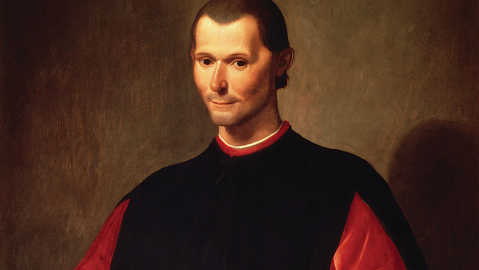What Machiavelli can teach you about leadership

The Italian Renaissance thinker Niccolò Machiavelli is considered one of the seminal figures in modern political science, even though his most important text The Prince was written in 1513. In the book he described a certain kind of behavior that’s come to be regarded as a manual for powerful rulers. The book has been so influential that the word “Machiavellian” became an adjective synonymous with immoral, brutal politicians.
While he was a politician and diplomat in Florence, Machiavelli was not known as a ruthless, cunning manipulator himself. Rather, a lot of his insight was informed by the actions of the powerful families of his day like the Borgias and the Medicis. The lessons of his book are rooted in realism and can be useful to any leader. Granted, there are some aspects of Machiavelli’s teachings that are surely controversial and should be viewed in light of their historical context.
Here are some key ideas to take to heart:
1. The end justifies the means
Machiavelli often gets credit for saying this classic quote about consequentialism which says that a morally right act is one that causes a positive outcome. But the way you get to that goal is not important and can be immoral.
While he expressed such a sentiment in other ways, Machiavelli didn’t actually say this famous maxim. What he did think was more nuanced, proposing that people don’t necessarily want to focus on the details and tend to judge leaders by results. In fact, Machiavelli’s thoughts describe how a modern politician might deal with the media, which can be baited and confused by strong actions. Does anyone come to mind as you read this from Chapter 18 of ThePrince:
[M]en judge generally more by the eye than by the hand, because it belongs to everybody to see you, to few to come in touch with you. Every one sees what you appear to be, few really know what you are, and those few dare not oppose themselves to the opinion of the many, who have the majesty of the state to defend them; and in the actions of all men, and especially of princes, which it is not prudent to challenge, one judges by the result.
For that reason, let a prince have the credit of conquering and holding his state, the means will always be considered honest, and he will be praised by everybody because the vulgar are always taken by what a thing seems to be and by what comes of it; and in the world there are only the vulgar, for the few find a place there only when the many have no ground to rest on.
While his advice might apply well to corporate leaders as well as political, we can see the limitations of such approaches when confronted with the social media outrage culture. Like the United Airlines fiasco recently showed, some “means” will be called out and debated. In the political sphere, however, especially in a hyper-partisan atmosphere, the methods might often be argued but the results of actions will likely overwhelm any details.
2. It’s better to be feared than loved if you cannot be both
He didn’t say it exactly the way it’s been spread around the Internet. His exact quote in chapter 17 was:
“A question arises: whether it be better to be loved than feared or feared than loved? It may be answered that one should wish to be both, but, because it is difficult to unite them in one person, it is much safer to be feared than loved, when, of the two, either must be dispensed with.”
The advice here can certainly be taken to extremes, with visions of authoritarian figures ruling through intimidation and secret police. Taken on a broader basis, the idea is that fear is simpler to maintain for a ruler than love, which can be fickle. The key is to avoid being hated, which is when people can really turn against you.
How do you instill that fear? Machiavelli maintained that the “dread of punishment” was important for a smart prince to institute. Cruelty was also some times necessary. Very much a law and order kind of guy, Machiavelli called for strong examples to be made of offenders as lessons to others:
“With a few exemplary executions, he will be more merciful than those who, through too much mercy, allow disorders to arise, from which follow murders or robberies. These harm the whole people, while those executions he ordered offend only the individual.”
3. Strong public outreach/propaganda
In chapter 15, Machiavelli talks about qualities that a leader should appear to possess and thus would need to cultivate in some measure. When talking about things that would bring a prince praise or blame, the Italian thinker describes it this way:
“One is reputed generous, one rapacious; one cruel, one compassionate; one faithless, another faithful; one effeminate and cowardly, another bold and brave; one affable, another haughty; one lascivious, another chaste; one sincere, another cunning; one hard, another easy; one grave, another frivolous; one religious, another unbelieving, and the like. And I know that every one will confess that it would be most praiseworthy in a prince to exhibit all the above qualities that are considered good”.
How many of these characteristics are still true for modern politicians or corporate leaders?
Basically, no matter what you do to stay in power, one aspect to not neglect is strong public relations. Good leaders must appear to have certain characteristics even if they don’t actually have them. The case of the tone-deaf United Airlines CEO’s initial response to the outrage over a passenger dragged out of their plane comes to mind.
4. “It is necessary to be a fox to discover the snares and a lion to terrify the wolves.”
This passage means that some times a leader can’t always respond by brute force and must act with insight to recognize the any traps. But against other opponents, like against “the wolves,” a leader should be ready to show strength of a “lion” to gain respect.
In other words, know your weak spots, be cunning, and ruthless when necessary.
5. Build an enduring leadership structure and strong team
Machiavelli saw that a strong prince is ultimately as good as his “servants”.
“The first opinion which one forms of a prince, and of his understanding, is by observing the men he has around him,” wrote Machiavelli in Chapter 22 of the book.
He says that if such “men” around the prince are “capable and faithful,” then the prince will be considered wise. Otherwise, if the servants are failing, it’s the prince’s “error” for choosing such help.





